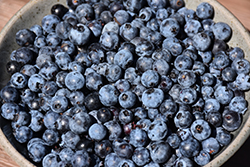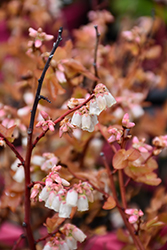It's all about ...
plants

Brunswick Lowbush Blueberry
Vaccinium angustifolium 'Brunswick'
Height: 6 inches
Spread: 3 feet
Sunlight:
![]()
![]()
Hardiness Zone: 3a
Brand: Monrovia
Description:
Pretty urn-shaped flowers in spring followed by flavorful sky blue berries; distinctive blue-green foliage turns bronze and red shades in fall; a great groundcover or low border
Edible Qualities
Brunswick Lowbush Blueberry is a small shrub that is typically grown for its edible qualities, although it does have ornamental merits as well. It produces clusters of sky blue round berries which are usually ready for picking from early to mid summer. The berries have a tart taste and a firm texture.
The berries are most often used in the following ways:
- Fresh Eating
- Cooking
- Baking
- Preserves
Features & Attributes
Brunswick Lowbush Blueberry features dainty clusters of white bell-shaped flowers hanging below the branches from early to mid spring, which emerge from distinctive shell pink flower buds. It has bluish-green deciduous foliage which emerges coppery-bronze in spring. The oval leaves turn outstanding shades of coppery-bronze, scarlet and crimson in the fall. It features an abundance of magnificent sky blue berries from early to mid summer.
This is a spreading deciduous shrub with a spreading, ground-hugging habit of growth. Its relatively fine texture sets it apart from other landscape plants with less refined foliage. This is a relatively low maintenance plant, and usually looks its best without pruning, although it will tolerate pruning. It is a good choice for attracting birds to your yard. It has no significant negative characteristics.
Aside from its primary use as an edible, Brunswick Lowbush Blueberry is sutiable for the following landscape applications;
- Mass Planting
- General Garden Use
- Groundcover
- Naturalizing And Woodland Gardens
- Orchard/Edible Landscaping
- Container Planting
Planting & Growing
Brunswick Lowbush Blueberry will grow to be only 6 inches tall at maturity, with a spread of 3 feet. It tends to fill out right to the ground and therefore doesn't necessarily require facer plants in front. It grows at a medium rate, and under ideal conditions can be expected to live for approximately 20 years. While it is considered to be somewhat self-pollinating, it tends to set heavier quantities of fruit with a different variety of the same species growing nearby.
This shrub can be integrated into a landscape or flower garden by creative gardeners, but is usually grown in a designated edibles garden. It does best in full sun to partial shade. It does best in average to evenly moist conditions, but will not tolerate standing water. It is very fussy about its soil conditions and must have sandy, acidic soils to ensure success, and is subject to chlorosis (yellowing) of the foliage in alkaline soils. It is quite intolerant of urban pollution, therefore inner city or urban streetside plantings are best avoided, and will benefit from being planted in a relatively sheltered location. Consider covering it with a thick layer of mulch in winter to protect it in exposed locations or colder microclimates. This is a selection of a native North American species.
Brunswick Lowbush Blueberry is a good choice for the edible garden, but it is also well-suited for use in outdoor pots and containers. Because of its spreading habit of growth, it is ideally suited for use as a 'spiller' in the 'spiller-thriller-filler' container combination; plant it near the edges where it can spill gracefully over the pot. Note that when grown in a container, it may not perform exactly as indicated on the tag - this is to be expected. Also note that when growing plants in outdoor containers and baskets, they may require more frequent waterings than they would in the yard or garden. Be aware that in our climate, most plants cannot be expected to survive the winter if left in containers outdoors, and this plant is no exception. Contact our experts for more information on how to protect it over the winter months.

